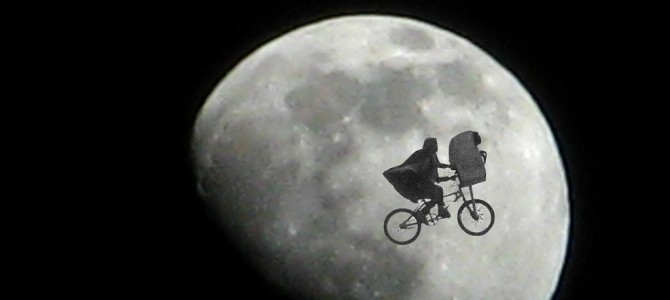Ken Ham, president of Answers in Genesis, is on to something.
Mocked by secular materialists and kept at arm’s length by embarrassed proponents of theistic evolution and intelligent design, the outspoken voice of literal, six-day creationism who famously debated “Science Guy” Bill Nye is again in the news.
Recently Ham proposed that humans should cease exploring space if our goal in doing so is to locate extraterrestrial life. Ham asserts that either a) E.T. doesn’t exist or b) if aliens do exist, they won’t find be saved by Christ because they are not human. Once again, everyone is prepped to fall on the scale from chuckle to outrage as Ham voices another opinion, and normally I’d be right there with the best of them (around the time of Ham’s debate with Nye, I confess to voicing uncharitable words about Ham’s intellect.)
But Ham is actually on to something when he says Christ died for mankind and not for any hypothetical sentient extraterrestrial beings. Yes, most Christian eschatology holds that all of creation will be redeemed in the Second Coming. But classical Christian anthropology always has man as the zenith of creation. As creatures made specifically in God’s image and likeness, i.e., possessing reason and immortality, humans are the great culmination and fruition of the whole work of creation. To save this pitiful creature from itself, He even became one of them in order to save them.
Bodies Do Matter
From that basic layout, there are limits on what extraterrestrial life could be like. Now, one might be tempted to say that man was not the only creature made in the image and likeness of God. Humanity could conceivably be one kind amongst many other creatures endowed with reason and immortality that God created.
However, this formula denies the soul-body combination that is essential to Christian anthropology. It makes the matter and body of the creature extrinsic to its soul. Actually the soul is the form of the body—in other words, a human soul cannot inhabit anything other than a human body. Therefore, if what makes a human soul different from an animal soul is the ability to reason and to survive the body, it follows that only human beings would be made in the image and likeness of God. So unless aliens are basically humans (perhaps akin to Star Trek, where all the disparate species look mostly the same and can even interbreed) there are probably no aliens that possess rational souls. To put it another way, any alien that appeared other than human (tentacles, tripedal, hermaphroditic, etc.) would have a different kind of soul than a human one, and would therefore not be rational because what makes a soul human is its rationality and immortality.
Christ Became Man, Not Alien
The reality of the Incarnation also limits the possibility of alien life. As St. Gregory of Nazianzus said, “For that which He has not assumed He has not healed; but that which is united to His Godhead is also saved.” The Word of God became fully a human being, totally and completely, and this makes the salvation of mankind possible. This would not only exclude all hypothetical aliens but also all the angels as well. While angels do possess rational souls, their immateriality severely limits their freedom of will and therefore they cannot be made in the full image and likeness of God. Since they do not possess bodies, they are also not redeemed by Christ. To come at it from another direction, as Christian we can affirm there are supraterrestrial beings but not extraterrestrial beings that possess rationality because a rational soul embodied is, by definition, a human being.
Perhaps one could try to get around this and say that the Word of God became incarnate, not only as Jesus of Nazareth, but under various other alien forms, in order to save those beings as well. However, this turns the Incarnation into more of a manifestation or a habitation. Jesus or whatever alien messiahs are merely seen as a suit or shell that the Word resides in; the Word in one sense is not really and totally that thing, which must be the case in order for that said thing to be saved. That the Word became Jesus of Nazareth, a first-century Jewish carpenter, is seen as incidental, one of many masks that the Word puts on as it goes about redeeming all rational beings throughout the cosmos. To divide the human or created nature of Christ and His divine nature is actually a heresy called Nestorianism. At the very least, the idea that Jesus Christ is just one of many manifestations of the Word strikes me as underwhelming.
This is, of course, speculative, and I could be mistaken. That being said, it seems quite unlikely there are aliens with rational souls that are capable of being saved by Christ. If we were to find alien life at all, they would essentially be a kind of animal. They could even be animals that are more intelligent and sophisticated than any animal we know (Peter Watts, in his novel “Blindsight,” mused about aliens entirely lacking self-consciousness yet capable of space travel), but they would not be promised eternal life.
Hell Is Out of the Picture
Ham also stands accused of saying these hypothetical beings would be consigned to burn in hell for simply not being human. However, nowhere in his original post does he say that the aliens are going to hell. He merely says they are not going to be saved. If aliens have only animal souls—no matter how sophisticated—they would not persist through eternity in the same way human beings do. To accuse Ham of saying these aliens are going to hell because they aren’t saved is like saying your dog will go to hell because it isn’t saved either.
However, Ham’s conclusion that we should stop exploring space because of the unlikeliness of sentient alien life is quite wrong. As a part of stewardship and the increase of knowledge of His creation, human beings are called to go into all of the cosmos to better understand it for its own sake; whether we are met by aliens or not is a separate question entirely.
Surprisingly, Ham is right about something. If we say there could be alien beings made in the total likeness and image of God, just as humans are, we tempt heresy about human beings and how Christ saves us.









